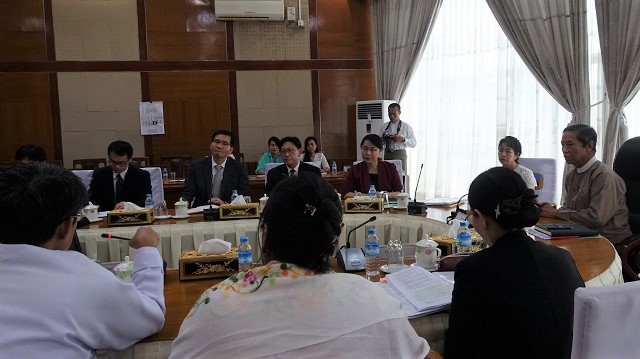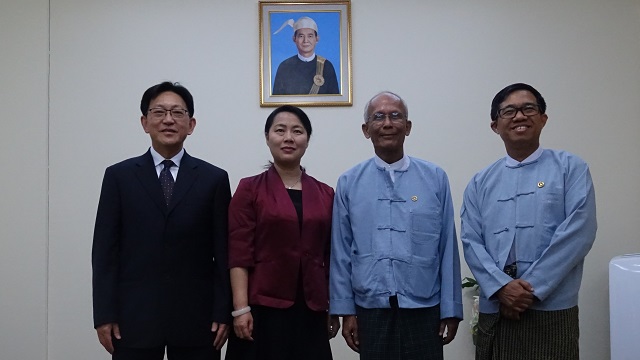
AMRO mission team meets with U Kyaw Win (far right), then Minister of Planning and Finance.
SINGAPORE, June 1, 2018 – Myanmar’s economy has been on a steady recovery path, but strengthened efforts on structural and institutional reforms are needed to develop a more market-based economy with inclusive growth, according to the preliminary assessment by the ASEAN+3 Macroeconomic Research Office (AMRO) after its Annual Consultation Visit to the country from May 15 to 25, 2018.
The mission was led by Lead Economist Dr Jae Young Lee, and participated by AMRO Director Dr Junhung Chang and Chief Economist Dr Hoe Ee Khor. Discussions focused on the prospects for growth, enhancing fiscal revenue and spending efficiency, strengthening the banking sector, and structural reforms to enhance the growth potential. During the visit, the mission also discussed technical assistance activities with the authorities.
“The economy grew by 6.8 percent in Fiscal Year (FY) 2017/18, rebounding from 5.9 percent in the previous FY, due to a recovery in agriculture and expansion in manufacturing activities,” said Dr Lee, “Structural and institutional reforms are needed to enhance growth potential and attract more foreign investment. The authorities’ efforts on strengthening and implementing the new prudential regulations for the banking sector and phasing out central bank fiscal deficit financing will help build a sound macro and financial environment.”
Looking forward, growth is expected to increase to 7.1 percent in the period of April to September 2018 and further accelerate to 7.4 percent in the new FY 2018/19, which will start from October 2018 to September 2019.
The external position has been improving with strong exports in garments and aided by a rebound in global energy prices, together with continued foreign direct investment inflows. The external public debt has remained low while the Kyat has been stable against the USD in FY 2017/18.
While credit growth has remained high, it has been decelerating with a slowdown in loans from domestic banks due to stricter regulatory requirements.
The direct impact from the ongoing ethnic tension in the Rakhine State remains largely localized while the indirect impact on the economy could be more pronounced. Subdued revenue from state economic enterprises (SEEs) and subsidies to loss-making SEEs continue to put pressure on the fiscal position. Nonperforming loan ratios of bank loans under the stricter regulatory framework are relatively high and we welcome the authorities’ efforts to work with the banks address the issue.

From left to right: AMRO Chief Economist Dr Hoe Ee Khor; AMRO Director Dr Junhong Chang; U Soe Thein, Deputy Governor of Central Bank of Myanmar (CBM); and U Bo Bo Nge, CBM Deputy Governor
Enhancing tax revenue and containing current expenditure are critical to strengthening the fiscal position while improving spending efficiency and directing more resources to priority areas are urgently needed. SEE reform should be a priority to improve their economic efficiency.
The introduction of a more disciplined monetary policy framework has contributed to reducing macroeconomic imbalances and inflation. The progress in implementing the money-targeting framework is commendable, and further development of the interbank market and repo market should pave the way for eventually moving to a more interest-rate based monetary policy framework.
The new banking regulations will enhance the soundness of the financial system and its resilience, but the implementation should be managed judiciously to minimize adverse impact on the banks and the economy. AMRO welcomes the Central Bank of Myanmar’s close coordination with individual banks to formulate concrete plans for compliance based on an assessment of each bank’s balance sheet.
AMRO also welcomes the more flexible management of the exchange rate to align with market conditions. A further build-up of international reserves is recommended to cushion against external shocks.
We welcome the government’s initiative to launch the Myanmar Sustainable Development Plan, which will help align various policies and institutions in order for Myanmar to achieve stronger and more inclusive growth. Structural and institutional reforms to develop the market-based economy and inclusive growth should be accelerated under a comprehensive and coherent policy framework. Strengthening the rule of law should boost the private sector’ confidence in investing in the economy and help integrate the informal sector into the formal economy.
AMRO would like to express its appreciation to the Myanmar authorities and other counterparts for their excellent cooperation and warm hospitality. The consultation visit has deepened AMRO’s understanding of the current macroeconomic and financial situation, the macroeconomic policy framework, as well as structural reforms in Myanmar.
—
About AMRO:
The ASEAN+3 Macroeconomic Research Office (AMRO) is an international organization, established to contribute to securing the economic and financial stability of the ASEAN+3 region, which includes 10 members of the Association of Southeast Asian Nations (ASEAN) and China; Hong Kong, China; Japan; and Korea. AMRO fulfills its mandate by conducting regional macroeconomic surveillance, supporting the implementation of the Chiang Mai Initiative Multilateralisation (CMIM), and providing technical assistance to its members.
